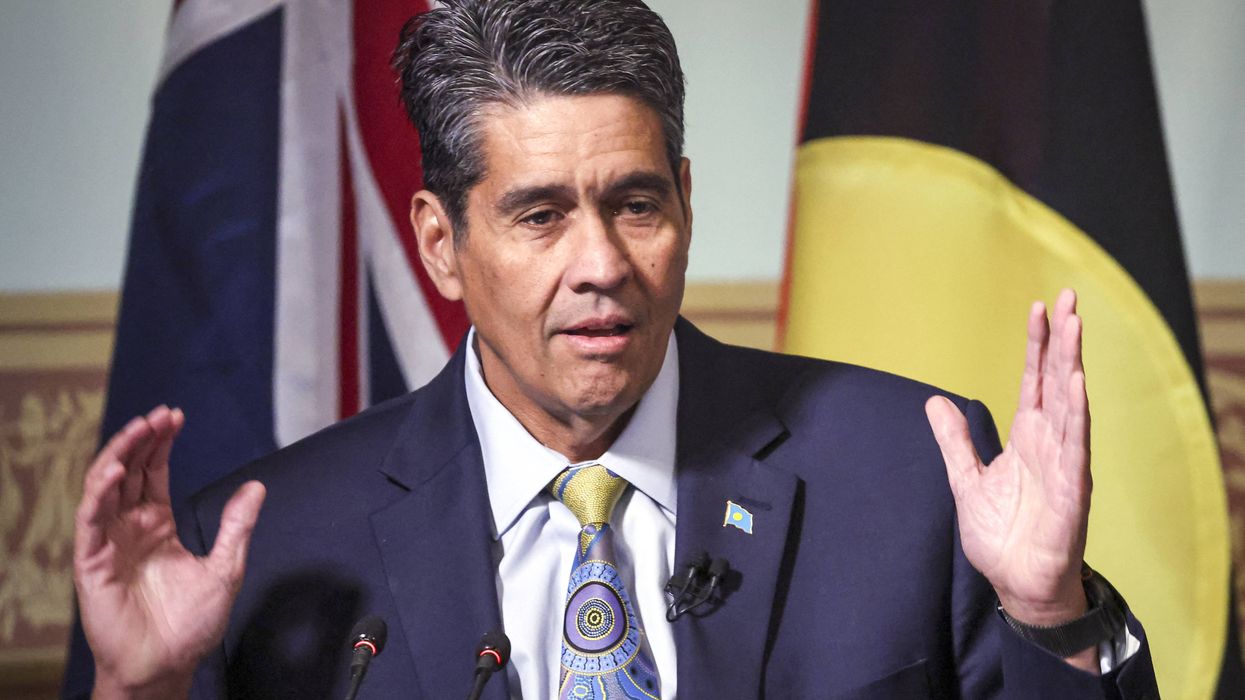April, 04 2022, 11:08am EDT

New IPCC Report Finds Sharp Cuts in Fossil Fuels and Emissions Urgently Needed, Policymakers' Failures Putting Climate Goals at Risk
Statements by Drs. Rachel Cleetus, Kristina Dahl at the Union of Concerned Scientists
WASHINGTON
Following a virtual session, the Intergovernmental Panel on Climate Change (IPCC) today released the third part of its Sixth Assessment Report, which focuses on mitigating climate change and assesses options for reducing global warming emissions and removing them from the atmosphere. It also builds on the first and second parts of the assessment, which covered the physical science basis for climate change and climate change impacts, adaptation, and vulnerability, respectively. Complementing the report is a summary document for policymakers that has been endorsed by governments.
This report is the result of several years of hard work by scientists from around the world, drawing on an exhaustive foundation of peer-reviewed scientific literature in a process that demands intensive scrutiny and consensus. Among its main findings, the IPCC's Working Group III emphasized emissions must be cut sharply within this decade and decline to net zero by roughly 2050 to limit global warming to 1.5 degrees Celsius, in line with the Paris Agreement. Such an endeavor requires transformative shifts across the economy and society, including ramping up energy efficiency, a complete transition to renewable energy to power homes and businesses, widespread electrification of vehicles, and increased conservation of forests and lands. In addition to the usual information past IPCC reports have covered, the latest iteration increases the inclusion of social science analyses; examines how mounting climate litigation could further climate action; and highlights the growing roles of cities, states, Indigenous Peoples, youth, and businesses in demanding and driving efforts to rein in global warming emissions.
Below is a statement by Dr. Kristina Dahl, a principal climate scientist at the Union of Concerned Scientists (UCS).
"The very first IPCC report found that limiting climate change and its resulting impacts would require nations to cut the majority of their heat-trapping emissions. Thirty-two subsequent years of inaction by policymakers and obstruction by the fossil fuel industry has led us in the opposite direction. This latest IPCC report finds that global emissions are now 54% higher than they were in 1990 and starkly points out that from 2010 to 2019, heat-trapping emissions were higher than ever and are still rising globally across all major sectors.
"To keep the principal goal of the Paris Agreement within reach, countries will need to strengthen their national pledges and decrease global heat-trapping emissions by roughly 40% relative to 2019 levels within this decade. Because we have failed to rein in global warming emissions to date, the choices available to us are no longer ideal. In addition to deep, absolute cuts in heat-trapping emissions, some amount of these emissions will also need to be removed from the atmosphere if nations are to limit planetary warming to 1.5 degrees or even 2 degrees Celsius. Most emissions removal options, however, come with substantial, and in some cases untenable, tradeoffs. On the other hand, surpassing the 1.5-degree Celsius threshold would lead to catastrophic climate impacts--with some so extreme adapting will no longer be feasible--as well as significant loss of life, property, and ecosystems in the United States and around the world. The science of climate change, its consequences, and the solutions to it could not be clearer. The ball is now in the court of world leaders and policymakers, who must act with the utmost urgency to address the global climate crisis."
Below is a statement by Dr. Rachel Cleetus, the policy director and lead economist for the Climate and Energy Program at UCS and an official civil society observer to the IPCC Working Group III process.
"This latest IPCC report puts policymakers on notice, yet again, that the current global trajectory of heat-trapping emissions is alarmingly off-track. Their continued inaction is directly responsible for the climate crisis already here, and it has also placed the goals of the Paris Agreement at grave risk. The solutions are obvious and have been for a long time--the world needs to rapidly phase out fossil fuels and accelerate the shift to clean energy. Richer nations, including the United States, bear significant responsibility for action because of their outsize contribution to global warming emissions.
"Fossil fuels are the root cause of climate change, of environmental injustices and--as we are witnessing in Ukraine right now--frequently associated with geopolitical strife and conflict. Transformative changes in how we get and use energy are entirely within our grasp as the costs of wind and solar power, as well as battery storage, tumble while innovation soars. What's urgently needed are robust policies and investments to cut heat-trapping emissions across every sector of the economy by scaling up energy efficiency, renewable energy, clean transportation, and electrification; protecting and restoring forests, soils and ecosystems; and investing in a just transition for communities and workers dependent on fossil fuels.
"Richer nations must also provide funding for low-income countries to make a clean energy transition aligned with sustainable development, yet those financial flows have been significantly lagging. Additionally, public and private financing for fossil fuels still exceed those for addressing climate change. The increased interest in climate litigation also signals the importance of holding fossil fuel companies accountable for the climate damages for which they are responsible.
"Decades of failure in global leadership, combined with fossil fuel companies' single-minded focus on their profits and unsustainable patterns of consumption within the world's richest households, are putting our planet at peril. Continuing down the current path leaves us poised to exceed 1.5 and even 2 degrees Celsius of warming. Every year policymakers choose to selfishly delay action from here on out is a testament to their lack of courage, which future generations will not soon forget. Instead, let's seize this precious, narrow window of opportunity to secure a safer, healthier and more just world."
If you would like to talk with Dr. Cleetus, Dr. Dahl, or another UCS expert on any of the three latest IPCC reports, please contact UCS Climate and Energy Media Manager Ashley Siefert Nunes.
Additional Resources:
- A UCS statement on part one (WGI) of the IPCC's Sixth Assessment Report.
- A UCS statement on part two (WGII) of the IPCC's Sixth Assessment Report.
- A recent blog post by Dr. Cleetus on the need for world leaders and policymakers to address crises happening simultaneously--such as the war in Ukraine and climate change--given a recent IPCC report says such crises will continue to intersect and overlap in the years ahead.
- A 2021 UCS report that offers a transformative framework to ensure a people-centered approach for transitioning the United States to a clean energy economy.
The Union of Concerned Scientists is the leading science-based nonprofit working for a healthy environment and a safer world. UCS combines independent scientific research and citizen action to develop innovative, practical solutions and to secure responsible changes in government policy, corporate practices, and consumer choices.
LATEST NEWS
US Launches Christmas Strikes on Nigeria—the 9th Country Bombed by Trump
Trump—who calls himself "the most anti-war president in history"—has now bombed more countries than any president in history.
Dec 25, 2025
President Donald Trump—the self-described "most anti-war president in history"—has now ordered the bombing of more countries than any president in history as US forces carried out Christmas day strikes on what the White House claimed were Islamic State militants killing Christians in Nigeria.
"Tonight, at my direction as Commander in Chief, the United States launched a powerful and deadly strike against ISIS Terrorist Scum in Northwest Nigeria, who have been targeting and viciously killing, primarily, innocent Christians, at levels not seen for many years, and even Centuries!" Trump said Thursday in a post on his Truth Social network.
"I have previously warned these Terrorists that if they did not stop the slaughtering of Christians, there would be hell to pay, and tonight, there was," the president continued. "The Department of War executed numerous perfect strikes, as only the United States is capable of doing."
"Under my leadership, our Country will not allow Radical Islamic Terrorism to prosper," Trump added. "May God Bless our Military, and MERRY CHRISTMAS to all, including the dead Terrorists, of which there will be many more if their slaughter of Christians continues."
A US Department of Defense official speaking on condition of anonymity told the Associated Press that the United States worked with Nigeria to conduct the bombing, and that the government of Nigerian President Bola Tinubu—who is a Muslim—approved the attacks.
It was not immediately known how many people were killed or wounded in the strikes, or whether there are any civilian casualties.
The Nigerian Ministry of Foreign Affairs said that “terrorist violence in any form, whether directed at Christians, Muslims, or other communities, remains an affront to Nigeria’s values and to international peace and security."
The US bombings followed a threat last month by Trump to attack Nigeria with “guns-a-blazing" if the country's government did not curb attacks on Christians.
Northwestern Nigeria—including Sokoto, Zamfara, Katsina, and parts of Kaduna State—is suffering a complex security crisis, plagued by armed criminal groups, herder-farmer disputes, and Islamist militants including Islamic State West Africa Province (ISWAP/ISIS) and Boko Haram. Both Christians and Muslims have been attacked.
Since emerging in Borno State in 2009, Boko Haram has waged war on the Nigerian state—which it regards as apostate—not against any particular religious group. In fact, the majority of its victims have been Muslims.
"According to the Armed Conflict Location and Event Data Project, more Muslims than Christians have been targeted in recent years," Chloe Atkinson recently wrote for Common Dreams. "Boko Haram has massacred worshipers in mosques, torched markets in Muslim-majority areas, and threatened their own coreligionists."
"The crisis in Nigeria is not a holy war against Christianity."
"It is true that Christian communities in the north-central regions have suffered unimaginable horrors as raids have left villages in ashes, children murdered in their beds, and churches reduced to rubble," she said. "The April massacre in Zike and the June bloodbath in Yelwata are prime examples of the atrocities taking place in Nigeria."
"The crisis in Nigeria is not a holy war against Christianity," Atkinson continued. "Instead, it’s a devastating cocktail of poverty, climate-driven land disputes, and radical ideologies that prey on everyone and not just any distinct group."
"By framing Nigeria’s conflict as an existential threat to Christians alone, Trump is not shining a spotlight on the victims," she added. "Instead, he is weaponizing right-wing conspiracy theories to stoke Islamophobia, the same toxic playbook he used to fuel his ban on Muslims, and which left refugee families shattered at America’s borders."
Former libertarian US Congressman Justin Amash (R-Mich.) noted on X that "there’s no authority for strikes on terrorists in Nigeria or anywhere on Earth," adding that the 2001 Authorization for Use of Military Force (AUMF)—which was approved by every member of Congress except then-Rep. Barbara Lee (D-Calif.)—"is only for the perpetrators of the 9/11 attacks."
"The War Powers Resolution doesn’t grant any authority beyond the Constitution," Amash added. "Offensive military actions need congressional approval. The Framers of the Constitution divided war powers to protect the American people from war-eager executives. Whether the United States should engage in conflicts across the globe is a decision for the people’s representatives in Congress, not the president."
In addition to Nigeria, Trump—who says he deserves a Nobel Peace Prize—since 2017 has also ordered the bombing of Afghanistan, Iran, Iraq, Libya, Pakistan, Somalia, Syria, and Yemen, as well as boats allegedly transporting drugs in the Caribbean Sea and Pacific Ocean. Trump has also deployed warships and thousands of US troops near Venezuela, which could become the next country attacked by a president who campaigned on a platform of "peace through strength."
That's more than the at least five countries attacked during the tenure of former President George W. Bush or the at least seven nations attacked on orders of then-President Barack Obama during the so-called War on Terror, which killed more than 940,000 people—including at least 432,000 civilians, according to the Costs of War Project at Brown University's Watson Institute for International and Public Affairs.
Trump continued the war on ISIS in Iraq and Syria started by Obama in 2014. Promising to "bomb the shit out of" ISIS fighters and "take out their families," Trump intensified the US campaign from a war of "attrition" to one of "annihilation," according to his former defense secretary, Gen. James "Mad Dog" Mattis. Thousand of civilians were killed as cities such as Mosul, Iraq and Raqqa, Syria were flattened.
Trump declared victory over ISIS in 2018—and again the following year.
Some social media users suggested Trump's "warmongering" is an attempt to distract from the Epstein files scandal and alleged administration cover-up.
"Bombing Nigeria won’t make us forget about the Epstein files," said one X user.
Keep ReadingShow Less
'Unhinged' Trump Wishes 'Merry Christmas to All, Including the Radical Left Scum'
"Nothing more Christian than to be a hateful wretched fuck on Jesus’ birthday," quipped one critic.
Dec 25, 2025
In a message called typically on-brand by observers, US President Donald Trump wished "Merry Christmas to all"—including his political opponents, whom he described in decidedly unchristlike language.
"Merry Christmas to all, including the Radical Left Scum that is doing everything possible to destroy our Country, but are failing badly," Trump said Christmas Eve on his Truth Social network.
"We no longer have Open Borders, Men in Women’s Sports, Transgender for Everyone, or Weak Law Enforcement," the president added. "What we do have is a Record Stock Market and 401K’s, Lowest Crime numbers in decades, No Inflation, and yesterday, a 4.3 GDP, two points better than expected. Tariffs have given us Trillions of Dollars in Growth and Prosperity, and the strongest National Security we have ever had. We are respected again, perhaps like never before. God Bless America!!!"
While nothing new—Trump has used past Christmas messages to tell people he doesn't like to "go to hell" and "rot in hell"—observers, including some MAGA supporters, were still left shaking their heads.
"Radical Left Scum" 😂🤣😂🤣😂🤣Christmas greetings from a liar, traitor, pedophile, and overall shitstain upon society.
[image or embed]
— Bill Madden (@maddenifico.bsky.social) December 24, 2025 at 9:00 PM
"Nothing more Christian than to be a hateful wretched fuck on Jesus’ birthday!" liberal political commentator Dean Withers said on X.
Another popular X account posted: "A sitting president of the United States using Christmas Day to spew venom at fellow Americans he calls 'Radical Left Scum' isn’t just unpresidential—it’s unhinged, un-Christian, and utterly beneath the office."
"This is the behavior of a bitter, small man who can’t even pretend to unify for one holy day," she added. "Shameful. Disgraceful. Pathetic."
Keep ReadingShow Less
Palau Signs Controversial $7.5 Million Deal to Take 75 Trump Deportees
"What if we spent the $100,000 per person in America setting them up with housing assistance, healthcare, education, etc?" asked one critic.
Dec 25, 2025
Palau said Wednesday that it has agreed to take in up to 75 people deported from the United States during President Donald Trump's purge of unauthorized immigrants in exchange for millions of dollars in financial assistance—a move that has sparked considerable opposition among the Pacific archipelago nation's roughly 18,000 inhabitants.
The office of Palauan President Surangel Whipps Jr. announced a memorandum of understanding with the United States under which the country will receive $7.5 million in assistance in exchange for taking in 75 third-country deportees who cannot be repatriated to their countries of origin.
Earlier this week, US State Department Principal Deputy Spokesperson Tommy Pigott said the people who will be sent to Palau have “no known criminal histories," as is the case with the vast majority of unauthorized immigrants in the United States, who have committed no crime other than the mere misdemeanor of entering the country illegally.
However, Palauans have voiced concerns over US Secretary of State Marco Rubio's remarks during a Cabinet meeting earlier this year in which he said that, “We want to send some of the most despicable human beings—perverts, pedophiles, and child rapists—to your countries as a favor to us."
Whipps said Wednesday that the relocation plan involves “people seeking safety and stability."
“These are not criminals,” the president said during earlier debate on the proposal. “Their only offense was entering the United States illegally and working without proper permits.”
However, Palau's Congress and its influential Council of Chiefs have twice rejected the transfers.
Piggot's statement "highlighted US commitments to partner with Palau on strengthening the country’s healthcare infrastructure, increasing Palau’s capacity to combat transnational crime and drug trafficking, and bolstering Palau’s civil service pension system."
Palau, which was administered by the US from 1947-94 and is now associated with the United States under the 1994 Compact of Free Association, which guaranteed the country nearly $900 million economic aid over 20 years in exchange for exclusive US military access.
The country's foreign policy often tracks closely to that of the US. For example, Palau is sometimes among the handful of usually similarly small nations that vote along with the United States and Israel against United Nations resolutions condemning Israeli crimes or affirming Palestinian rights.
Other developing nations including Eswatini, Rwanda, South Sudan, and Uganda have also agreed to take in US deportees or are considering doing so.
Reactions to the US-Palau agreement drew criticism on social media, where one X user called the deal a "bribe" and another popular Bluesky account asked, "What if we spent the $100,000 per person in America setting them up with housing assistance, healthcare, education, etc?"
Keep ReadingShow Less
Most Popular


